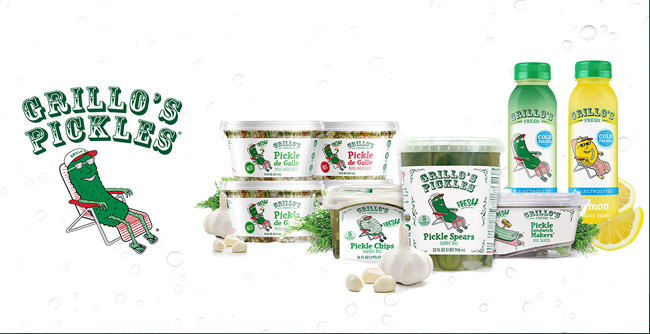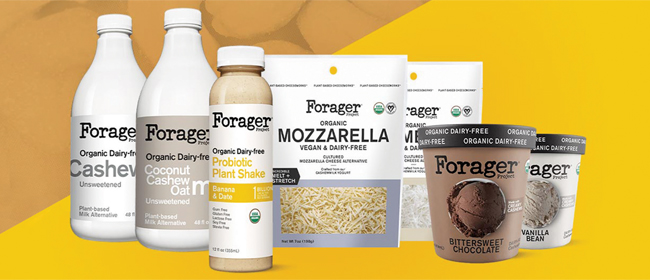NOSHscape: The Latest Food Brand News
Grillo’s Sells to Bakery Brand
Breakout Boston-based pickle brand Grillo’s Pickles has been sold to bakery brand King’s Hawaiian in a deal that closed earlier this year. While exact terms of the deal were not disclosed, the Boston Business Journal reported that the company will remain in Boston, albeit with changes to the leadership team: CEO and founder Travis Grillo has left the company.
The Massachusetts-based company had been in the market for an acquirer since last year. Grillo’s previously raised $4.6 million in 2018 and, according to SEC filings, an additional $2 million in March of 2020. Investors in the pickle brand included Breakaway Capital, Centerman Capital and Food Retail Ventures.
Founded in the 1950’s in Hawaii, King’s Hawaiian has remained a family-owned and operated business. The company now largely produces its sweet rolls and breads in Torrance, California and Oakwood Georgia.
Grillo’s was founded over a decade ago by Travis Grillo, who used a family recipe to develop his first product. What began as a pickle cart in Boston Common has since grown to a national packaged food brand, with presence in retailers including Whole Foods, Target, Costco, Publix, Kroger, Safeway, Amazon and an array of other mass and natural grocers. The product mix has also expanded to include hot pickles, spears and chips, cold-pressed pickle vinegar drinks and a pickle de gallo dip.
The company was one of the first national brands offering a cold-chain fermented product, but since then, the fermented food section of stores has expanded to include other national brands offering sauerkraut, kimchi and more. Grillo’s has remained trendy within the category with it’s irrelevant sense of humor, launching everything from clothing collaborations with Urban Outfitters to pickle-infused beer to co-branded Rugrats pickle packaging.
However, with Grillo’s departure, the driving force behind many of these collaborations is no longer with the company. Attempts to reach Grillo were unsuccessful, with his email account at the brand no longer operational. In the wake of his departure, Adam Kaufman (COO at Grillos since 2018 and operating partner at Centerman Capital) assumed the role of President earlier in April.
King’s Hawaiian did not respond to a request for comment and Grillo’s was unable to respond to press inquiries at this time.
Mid-Day Squares Closes Round, Looks to U.S. Expansion
Looking to straddle the confection and nutritional bar categories, bar brand Mid-Day Squares announced the closing of a $4 million funding round that will allow the outspoken Canadian company to expand further into the U.S. market.
The round was led by Boulder Foods Group (BFG), with participation from Selva Ventures, Harlo Capital, and several angel investors including Mike Fata, the founder of Manitoba Harvest. The brand previously had raised $2 million in a 2019 round led by BFG in addition to a $2.8 million low interest loan by the Canadian government.
Mid-Day Squares, which produces a three-SKU line of refrigerated protein bars, currently sells its products in roughly 200 U.S. retailers, including Erewhon and Jimbo’s, and 1,300 Candian stores. The four-year-old company expects to have $10 million in revenue for 2021 with “a very visible path” to $100 million in revenue within the next three years, co-founder Nick Saltarelli said.
While the company’s first raise was to support the build out of its Montreal-based production plant, this funding will go towards marketing and sales expenses associated with moving further into the U.S. market, as well as the associated costs of producing larger volumes. Ideally, Saltarelli said, 20% to 30% of sales revenue will come from the U.S. by the end of 2021. As it grows, Mid-Day plans to work Eastward from the West Coast and a particular focus on the Southern California and Texas markets.
“We’re not rushed to be in as many doors as possible,” co-founder Jake Karls said. “I’d rather be in less doors and instead focused on turns…because that creates fast growth and interest from everywhere.”
From starting in Saltarelli’s condo kitchen, where he created the brand alongside his wife Lezlie Karls Saltarelli, Mid-Day has been able to quickly scale up to support more stores because it self-manufactures. The co-founders opened their own production facility in January 2020, having decided to make the investment after being rejected by over 26 co-manufacturers, Saltarelli said.
Part of the need to self-produce is because the bar uses limited ingredients and is not shelf stable, but also due to its texture and formulation — which draws from both protein bar production and chocolate confection production. The end result, Saltarelli added, is a bar that has the snap of a typical chocolate bar but the protein content of a nutrition bar.
Still, it’s not just the product that’s unusual. The team is committed to a methodology they’ve dubbed “millennial manufacturing,” where production employees feel as valued and connected to the company’s growth as operations, sales and marketing staff. Working with a co-packer, Saltarelli said, where production employees are treated like “second class citizens,” just wasn’t an option.
The desire to buck trends continues into marketing. Karls, a former party and pop-up store promoter, has crafted a marketing strategy that relies heavily on social media. But rather than following the playbook of other brands, which tend to use glossy product shots, Mid-Day Squares shows behind the scenes footage of “the good, the bad and the ugly” of running a brand, he said. The company has a full time videographer to document its efforts, lending a reality TV show vibe to the brand’s social media channels. For example, recent posts on the brand’s Instagram page have featured everything from Karls Saltarelli and Saltarelli talking about “business therapy” and divorce to videos entitled “Building a Brand By Giving Zero F*cks.”
“We really focus on getting people to feel that they are buying from their neighbor and the consumer knows who they’re buying from,” Karls said, “So that they go in the store and say ‘oh that’s Nick, Jake and Lezlie,” [because they’re not] going to go into the store and say ‘oh I want that healthy chocolate bar.’”
Siddhi Capital Team Files for SPAC, Seeks a Better-For-You Brand
Having already made the jump from operational consulting to investing, the principals behind Siddhi Capital filed with the United States Securities and Exchange Commission (SEC) in March to launch a proposed special purpose acquisition company (SPAC). Anchor investors in the SPAC will include subsidiaries of hedge fund managers like BlackRock Inc. and Millennium Management LLC.
The Siddhi network began with outsourced operations firm Siddhi Ops, founded by Melissa Facchina. Facchina went on to partner with father and son team Brian Finn (the former CEO of Credit Suisse USA) and Steven Finn to launch Siddhi Capital in early 2020. The firm is currently investing out of a $70 million fund, which includes $20 million from preexisting investments made by the Finn family, placing capital in emerging food and beverage companies. Portfolio brands include Sakara, hint, No Evil Foods, Maverick Snacks, Noops, Moku and Recess.
With the formation of Siddhi Acquisition, the Siddhi Capital team is setting their sights on the public market. The Finns and Facchina will serve as co-founders, with Facchina and Steven Finn splitting the role of co-CEO while Brian Finn will also serve as chairman. Directors of the SPAC will include: Lauri Kien Kotcher, former CEO of personal care brand hello and former Senior Advisor at LCatterton; Susan Guerin, President and Chief Executive Officer of World Finer Foods; and Paul Nardone, former CEO of popchips; among others.
One advantage Siddhi Acquisition has over other SPACs, the team believes, is its unique background in finance and operations, which has resulted in deep relationships with investors, financial advisors, investment bankers, attorneys, consultants, commercial bankers, accountants and large CPG companies.
The plan is to continue to focus on food and beverage companies, seeking to take advantage of the “transformation” the industry is currently experiencing. Specifically, Siddhi Acquisition will seek a target that is focused on health and wellness or “better-for-you consumption,” such as businesses tackling sugar reduction, grain or gluten free options and plant-based meat and dairy analogs.
“The food and beverage industry is undergoing a transformation as competitors, both old and new, innovate and adapt to an evolving consumer,” the filing states. “We believe that there are many potential targets that are more aligned with this macro trend that could become attractive public companies with long-term organic growth, attractive competitive dynamics and further consolidation opportunities.”
Forager Expands Creamery Model with Ice Cream Launch
In April, former juice brand Forager Project announced it would launch plant-based ice cream — the next step in the company’s goal to become a plant-based “creamery.”
The ice cream will debut in five flavors: Vanilla Bean, Bittersweet Chocolate, Cookies and Cream, Salted Caramel and Mint Chip, the line will be available nationwide this Spring in retailers including Whole Foods Market, Natural Grocers, Market Basket and Earth Fare for $6.99 per pint. Using a base of cashew milk, coconut oil, sunflower oil, and oat flour, the line is soy-free, dairy-free and certified organic.
CEO and co-founder Stephen Williamson said ice cream was a “logical pathway” for the company: Having initially launched with juices, Forager has shifted to that of a plant-based creamery over the years with the introduction of plant-based yogurts, (which account for the majority of the company’s revenues), milks, sour cream, and cheese. For most of these items, Forager has turned to organic cashews as its alternative to dairy. Ice cream, Williamson said, was simply another product that could be produced from this base and utilize a similar supply chain.
Williamson declined to comment if the ice cream is made in the company’s Indio, California plant or at a co-packer — Forager currently utilizes both production options. For R&D the team turned to Neil Gottlieb, former Three Twins Ice Cream founder and CEO, he said.
The vegan ice cream set is competitive, with plenty of new entrants in the last few years ranging from Van Leeuwen, to Coolhaus to Brave Robot — but there’s also opportunity. In 2020, plant-based ice cream and novelties accounted for $435 million in sales, growing 20.4%.
To differentiate Forager’s ice cream from the competition and capitalize on that opportunity, Williams said the team focused on taste above all else. The goal was to produce a line that customers would see as indulgent, even if they are not vegan, he added. While plant-based is a trend itself, Forager also sought to avoid embracing any dietary restrictions that may quickly become a fad. For example, though the company prioritized using less sugar, Forager’s ice cream is made with cane sugar rather than alternative sweeteners.
“We operate from this mental model of ‘when you taste amazing food. You just know it.’ It doesn’t have to be complicated,” he said. “I’ve watched many diet fads go in and out…we’ve tended to operate from the perspective of what’s better than just organic minimally processed food?”
Forager’s move into ice cream follows the launch of plant-based cheeses in March. Available in Jack, Queso Fresco, Mozzarella and Parmesan, that line does have functional benefits, stemming from its base of probiotic cashew milk yogurt. Research found that most consumers use plant-based cheese as an ingredient in dishes, versus eating it on its own, so Williamson said the team focused on developing a cheese alternative that would melt, stretch and be incorporated easily into recipes.
Though the pace of innovation has been brisk in 2021 already, Williamson said he recognizes some products may be more successful than others, noting that he has emphasized “creating a culture that accepts failure and takes risks,” at Forager. The company has also not been afraid to discontinue previous launches, including juice or plant-base creamers.
That doesn’t mean these products are gone for good though, he added. For example, future launches may include other creamer products. Forager will also continue to invest in improving existing products, launching new formulations when needed.
“Being better at [our] core business is [our] number one priority. I don’t want to be caught asleep,” Williamson said. “Forager Project is a really a way to eat and wherever there is the opportunity to create amazing tasting organic products, we will forage into that space.”


Receive your free magazine!
Join thousands of other food and beverage professionals who utilize BevNET Magazine to stay up-to-date on current trends and news within the food and beverage world.
Receive your free copy of the magazine 6x per year in digital or print and utilize insights on consumer behavior, brand growth, category volume, and trend forecasting.
Subscribe


